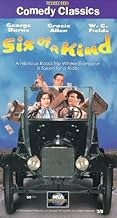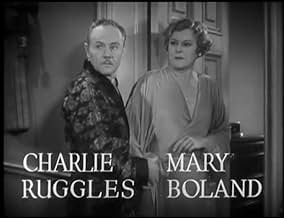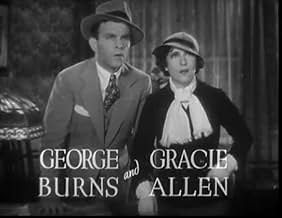Aggiungi una trama nella tua linguaWhen a respectable middle-class couple take a cross-country trip by auto, they share expenses with a decidedly oddball couple, none of whom know the car carries embezzled funds.When a respectable middle-class couple take a cross-country trip by auto, they share expenses with a decidedly oddball couple, none of whom know the car carries embezzled funds.When a respectable middle-class couple take a cross-country trip by auto, they share expenses with a decidedly oddball couple, none of whom know the car carries embezzled funds.
- Regia
- Sceneggiatura
- Star
- Premi
- 1 vittoria in totale
- J. Pinkham Whinney
- (as Charlie Ruggles)
- Traffic Cop
- (non citato nei titoli originali)
- Hotel Desk Clerk in Philipsburg
- (non citato nei titoli originali)
- Eyeshade Man
- (non citato nei titoli originali)
- Detective
- (non citato nei titoli originali)
- Woman
- (non citato nei titoli originali)
- Gillette's Secretary
- (non citato nei titoli originali)
- Drunk
- (non citato nei titoli originali)
- Tourist's Wife
- (non citato nei titoli originali)
Recensioni in evidenza
This is a lively, hilarious comedy, with the six stars - Charlie Ruggles & Mary Boland, W. C. Fields & Alison Skipworth, George Burns & Gracie Allen - all heartily engaged in doing what they did best: getting laughs.
Ruggles & Boland make another of their film appearances as husband & wife - this time rather more amorous than usual. They were a perfect team - she the strident lioness, he the nervous rabbit - and they dominate most of the screen time here. From beginning to end, they are a delight.
Burns & Allen continue the patter they originated in Vaudeville, perfected on radio & would eventually take to television, with George the perpetual straight man & Gracie the eternal fool. At times in the film she tends to go a bit over the top, but it's difficult to dislike her. Her heart was obviously made of solid gold.
While Skipworth is given rather short shrift - only fragments of her formidable personality flash through - Fields is in his element as the disreputable sheriff of Nuggetville, Nevada. Whether explaining how he got the nickname Honest John' or skulking about at night looking for the missing moola, he is never less than wonderful. Best of all, he gets to perform his entire classic pool routine, preserving it forever for a grateful posterity. Finally, he executes the near miraculous - he gets Gracie to shut up.
Paramount was so pleased with the success of SIX OF A KIND that they wanted to hurry the principle players into another comedy. Only Fields demurred. He felt he had now arrived at the point where he no longer needed to share a movie with other celebrity comics. The Studio finally agreed and began preparation of Fields' first solo starring feature, YOU'RE TELLING ME (1934).
The Fields poolplaying routine is priceless. I've seen it before but cannot recall where. But its inserted into this project without reference to anything else. Incidentally, it works as well as it does because there is a watcher in the frame, a deadpan face that is every bit as valuable and practiced as the actor.
That's indicative of how the experiment fails as a whole. If you know "Mad Mad Mad World," you'll know a successful example where comedic methods actually do bump up against each other and generate something resonant, rich, higher.
In this case however, the comedic models take turns. Isn't as effective.
Ted's Evaluation -- 2 of 3: Has some interesting elements.
A better film, but also affected by dueling comic egos, was W.C. Fields and Mae West in MY LITTLE CHICKADEE, which jettisoned the script for a series of duels of one liners between the leads. But the one liners were equally funny, so the film remains a success.
But SIX OF A KIND is an example of six film comics who worked well together. The reason is simple: it is really three comic teams working together: Charlie Ruggles and Mary Boland, George Burns and Gracie Allan, and W.C. Fields and Alison Skipworth. Ruggles and Boland were paired in about half a dozen comedies during the 1930s, usually with Boland as a somewhat bossy wife, and Ruggles as a nervous wreck of a husband. Fields (usually a single act) was paired three times with Skipworth (TILLY AND GUS and IF I HAD A MILLION were the other two times). Skippy always figured out how to control or counter the larcenous activities of her man - it the present film she takes action into her own hands with the stolen money that is being searched for (she knows that the local sheriff, Fields, is not the one to trust with this). As for Burns and Allan they manage to effortlessly involve themselves with the put upon Ruggles and Boland on their cross-country trip by car.
Ruggles quickly gets to realize what a mistake it was to agree to travel with Gracie - at one point she manages to cause him to fall off a cliff, and dangle from a branch. He is relatively helpless when she insists on 1) photographing him on his perch, and 2) correcting his grammar. The presence of George and Gracie's humongous dog ("Ran Tang Tang" is it's name) does not make travel arrangements easier for Charlie and Mary.
Fields has some choice moments. When he insists on shouting at the quartet, he says he's allowed to do so - he's the sheriff! He also explains, during a pool game, the improbable story of how he got his undeserved moniker "Honest John". You have to listen carefully to the tale, as it is interrupted with his attempts to play pool a few times (once getting accidentally beaned by a billiard ball), but it does show that there were items that even Fields would have had no reason to steal.
Oh, in the "Summary Line", I mentioned a forgotten actor named Bradley Page - he was the man who is responsible for the trouble that Charley Ruggles is suspected of. Bradley has to have a reason to leave town in order to catch up with the unwary Ruggles and Boland, so he telephones his girl friend. He tells her to call back his job and say that he has to leave town because somebody has died. There is a pause as he apparently hears a question shot back by the girlfriend. "ANYBODY!", he says - clearly annoyed. Although the bulk of the humor in the film is carried by the sextet of performers, Mr.Page happened to have the most amusingly unexpected line in the film.
Lo sapevi?
- QuizOne of over seven hundred Paramount Pictures productions, filmed between 1929 and 1949, which were sold to MCA/Universal in 1958 for television distribution, and have been owned and controlled by Universal ever since. Local sponsor interest was minimal, and its initial television broadcasts were few and far between. Its earliest documented telecast took place in Denver 25 May 1959 on KBTV (Channel 9); it first aired in Miami Saturday, April 2, 1960 on Comedy Playhouse on WTVJ (Channel 4). It was released on DVD February 4, 2003 as one of three George Burns and Gracie Allen films, and again November 15, 2016 as a single as part of the Universal Vault Series.
- BlooperGeorge Burns' character Name is shown onscreen as "George Edward", but "Edwards" is consistently spoken as his surname.
- Citazioni
Gracie De Vore: Oh, what's that?
George Edwards: You wouldn't understand. This is a map.
Gracie De Vore: Oh, sure, I know what a map is. It's what you take every afternoon when you're tired. I always take an afternoon map.
George Edwards: An afternoon map?
Gracie De Vore: Sure.
George Edwards: I bet when you went to school, you never even reached the fifth grade.
Gracie De Vore: Aw, don't be silly. I spent three of the happiest years of my life in the fifth grade.
- ConnessioniFeatured in Hollywood: The Gift of Laughter (1982)
I più visti
Dettagli
- Data di uscita
- Paese di origine
- Lingua
- Celebre anche come
- Six of a Kind
- Luoghi delle riprese
- Azienda produttrice
- Vedi altri crediti dell’azienda su IMDbPro
- Tempo di esecuzione1 ora 2 minuti
- Colore
- Proporzioni
- 1.37 : 1
Contribuisci a questa pagina






































